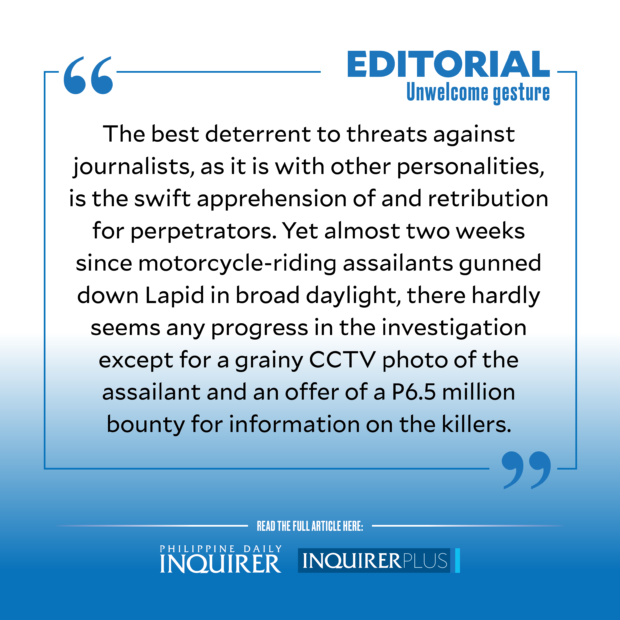Unwelcome gesture
Television reporter JP Soriano of GMA News did the right thing when he posted about the police’s surprise visit to his residence over the weekend, ostensibly to check on threats to his safety following the killing of broadcaster Percival “Percy Lapid” Mabasa on Oct. 3.
In a post on Twitter, Soriano said a plainclothes police officer showed up in his house on Friday to inquire about his security. The officer said the Philippine National Police had directed them to check on journalists (“kumustahin” was the word used) after Mabasa’s killing and the recent online threats to other broadcast journalists Ed Lingao and Lourd de Veyra.
Article continues after this advertisementAfter Soriano assured him he had received no such threats, the cop asked to take his picture “for documentation,” which was politely declined. The cop then left to go to another journalist’s house in his neighborhood, Soriano said.
Alarmed, the reporter called up Marikina Mayor Marcy Teodoro, who said another journalist had already informed him of a similar unannounced visit by the police. The mayor said that, upon inquiry, the PNP confirmed the instruction to conduct home visits on journalists.
Which immediately raises several issues. As Soriano tweeted, how did the police get his home address, an act that constitutes a violation of his privacy? Who else was on the list for home visits, and how did the police manage to secure their personal information as well? Far from being reassuring, the act was plain and simple intimidation.
Article continues after this advertisementAs Soriano’s post went viral, National Capital Regional Police Office (NCRPO) chief Brig. Gen. Jonnel Estomo confirmed that the visit was “our gesture to know if there are any threats on the lives [of journalists] and their families in order to assess the security assistance that we have to accord them.” Estomo acknowledged that the visit had caused “undue alarm and fear” and apologized to the media, adding that he had ordered all police chiefs, down to the stations, to stop the unwanted attention.
That the PNP or the NCRPO did not inform the public nor the journalists about such initiative lends doubt to the motive behind such an undertaking, coming as it does amid a climate of continuing threats, Red-tagging, and online attacks against media practitioners, lawyers, human rights defenders, activists, and militant groups.
Such initiatives could have been coordinated with media organizations or the broadcasters’ home network. There is also an existing Presidential Task Force on Media Security that could have helped the police in conducting proper consultation and coordination with journalists.
The ill-advised and unwelcome gesture has a chilling effect and, according to the National Union of Journalists of the Philippines (NUJP), only adds to the anxiety among journalists.
And with good reason. The surprise home visit by plainclothes police bears an eerie similarity to “Oplan Tokhang” implemented by the PNP during President Rodrigo Duterte’s term, with police officers “knocking” on people’s homes during ungodly hours. The home visits often ended with the death of suspected drug users who allegedly fought it out (“nanlaban”) with the police.
The best deterrent to threats against journalists, as it is with other personalities, is the swift apprehension of and retribution for perpetrators. Yet almost two weeks since motorcycle-riding assailants gunned down Lapid in broad daylight, there hardly seems any progress in the investigation except for a grainy CCTV photo of the assailant and an offer of a P6.5 million bounty for information on the killers.
Similarly, other media killings have remained unsolved. The NUJP has listed 197 journalists killed since 1986, making the Philippines one of the most dangerous countries for journalists, according to the media freedom watchdog Reporters Without Borders.
The government must also actively discourage and stop the Red-tagging and trolling of journalists and other personalities by its own agencies and officials, as the National Task Force to End Local Communist Armed Conflict has been doing recklessly and relentlessly.
The PNP, military offices, and no less than Justice Secretary Jesus Crispin Remulla have engaged in Red-tagging, with the latter describing it as “par for the course,” and “probably the essence of democracy” in the recent 136th session of the United Nations Human Rights Committee in Geneva.
In the end, the best thing government can do is to let journalists do their job of reporting the news freely, independently, and fairly, without interference from its agencies and instrumentalities that would always be perceived as threats to freedom of the press and freedom of speech. As the Nobel Peace prize committee said in awarding the coveted prize to journalists Maria Ressa and Russia’s Dmitry Muratov, freedom of expression is a “precondition for democracy and lasting peace.”

















